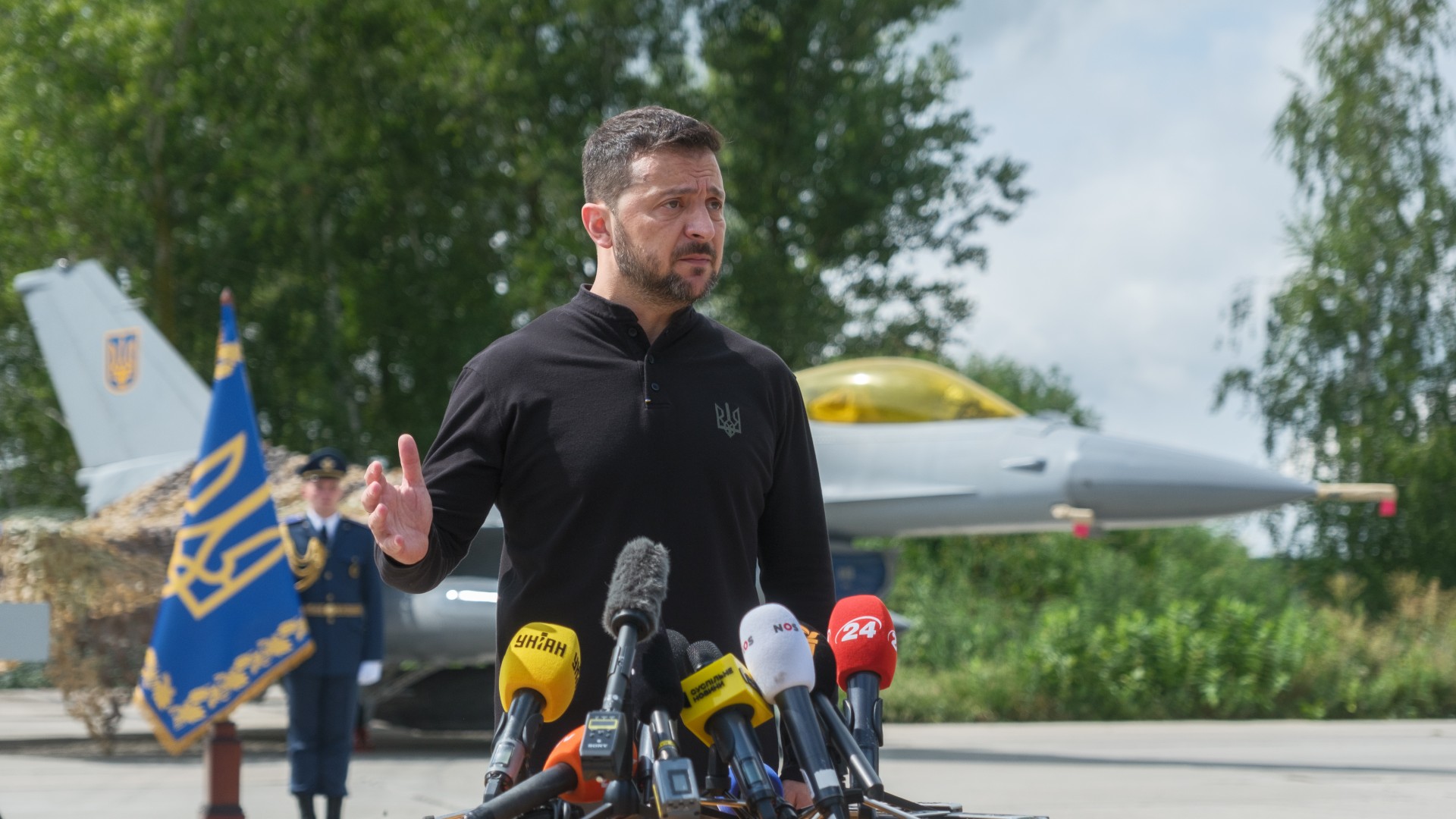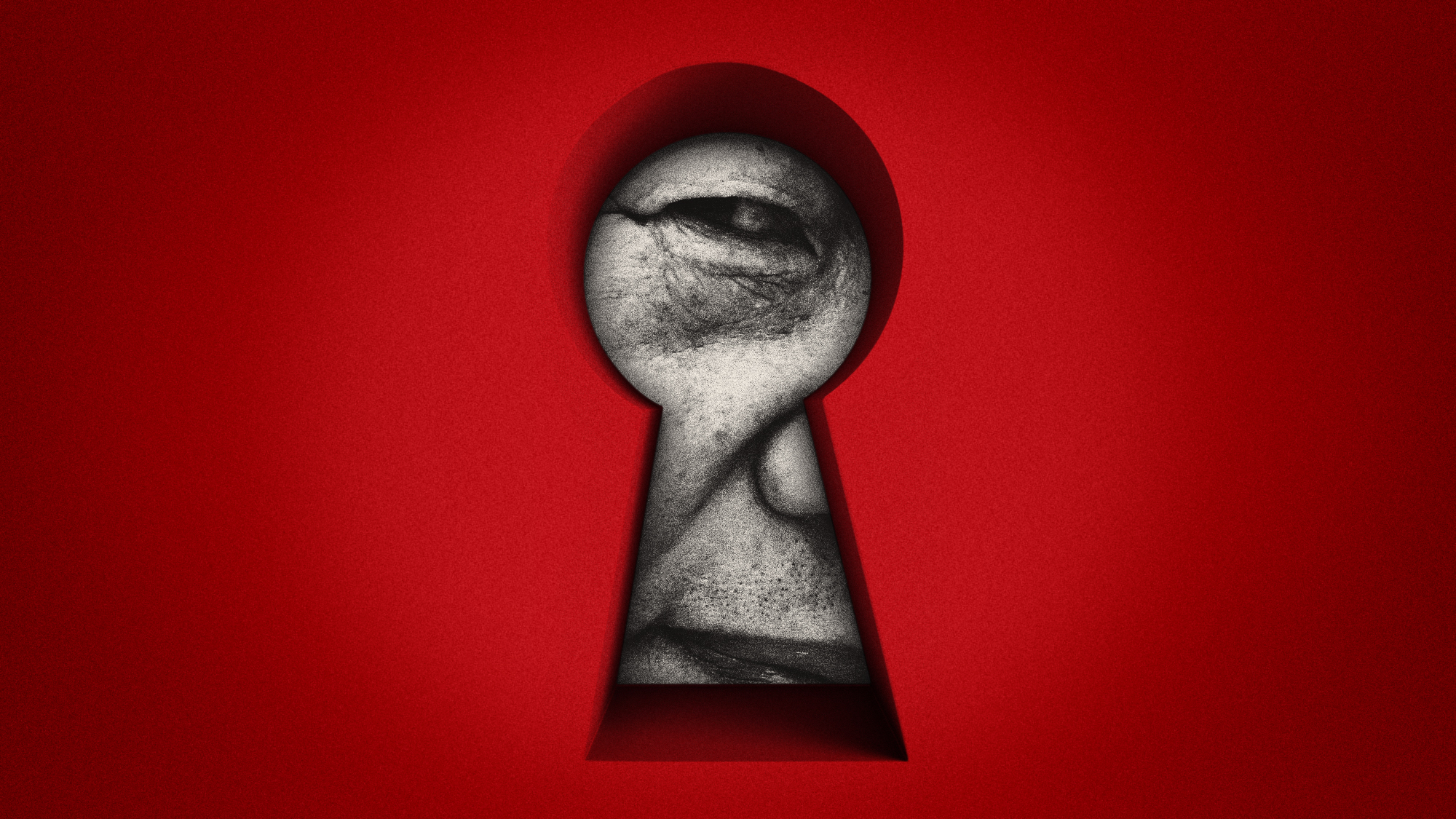Are Ukraine's F-16 fighter jets too little too late?
US-made aircraft are 'significant improvement' on Soviet-era weaponry but long delay and lack of trained pilots could undo advantage against Russia

A free daily email with the biggest news stories of the day – and the best features from TheWeek.com
You are now subscribed
Your newsletter sign-up was successful
The long-awaited arrival of American F-16 fighter jets in Ukraine marks "a new chapter" in the war against Russia.
So said Volodymyr Zelenskyy on Sunday, confirming for the first time that the aircraft had started operations against Russian forces. "We often heard the answer that it was impossible," the Ukrainian president said during the unveiling ceremony for the country's Air Force Day. "Now it is a reality."
Kyiv has been urging its Nato allies to provide the supersonic "Fighting Falcons" jets since the early days of the war. The so-called F-16 coalition of European nations – led by Denmark and the Netherlands, and including Belgium and Norway – promised to send 79, but had to await US approval for the export, which the Biden administration granted only last August. Training pilots to use the aircraft has since taken months.
The Week
Escape your echo chamber. Get the facts behind the news, plus analysis from multiple perspectives.

Sign up for The Week's Free Newsletters
From our morning news briefing to a weekly Good News Newsletter, get the best of The Week delivered directly to your inbox.
From our morning news briefing to a weekly Good News Newsletter, get the best of The Week delivered directly to your inbox.
"I am proud of our guys who are mastering these jets and have already started using them for our country," Zelenskyy said, thanking allies. "It's good that they are here and that we can put them to use."
What did the commentators say?
It was a "pivotal moment for Ukraine", said CNBC, as Zelenskyy watched two F-16s "roar overhead". Kyiv has "repeatedly requested" the aircraft and Ukraine hopes they will "change the dial" in the war. "F-16s bring just and lasting peace closer," Zelenskyy said earlier this year.
They do "offer a significant improvement" to jets Ukraine inherited from the USSR, said CNN. They can provide air cover for ground troops and critical infrastructure, or attack Russian targets and enemy planes.
Their arrival is "better late than never", said The Economist. Although numbers are "too few", their importance "should not be underestimated". The immediate impact will be a "boost to morale". They could also "lessen the impunity" with which Russian glide-bomb aircrafts have been "pummelling Ukraine's front lines"; the Russian aircrafts' range means they don't have to leave Russian airspace and risk being shot down. The F-16s can use cheaper heat-seeking missiles to take out those munitions.
A free daily email with the biggest news stories of the day – and the best features from TheWeek.com
However, there has been a "pitiful" lack of training slots for Ukrainian pilots. F-16s are very different and more complex than the aircraft they know.
Zelenskyy declined to specify "the numbers involved", said the Kyiv Post. But he admitted that the number of jets and trained pilots is "not enough". Far from it. The Ukrainian army will only be able to use a handful of jets in combat at a time, as two pilots are needed for each plane.
Ukrainian officials also warned that the long delay in delivering the F-16s could have allowed Russia time to adapt its tactics. Indeed, Russia has already benefited, said Robert Clark, director of defence and security at Civitas, in The Telegraph.
The Russian offensive around Kharkiv this year put "immense pressure" on Ukraine's defensive lines. Russia sought to "capitalise" on that with "devastating" missile and drone attacks on civilians and infrastructure – even schools and hospitals. Meanwhile, politicians "dithered and delayed time and again" with "pointless discussions" about Russian escalation. Western lawmakers "insist on the political luxury of time" – which Ukrainian frontline troops "pay for in blood".
"The sad truth is that this war could have been won a long time ago," said Clark. It may now never be won unless the West can "find its collective courage" and send Ukraine the weapons it needs, before it's too late.
What next?
Ukraine should be flying 20 of the fighter jets by the end of 2024. "Many of our men are currently studying and training," said Zelenskyy. Western allies will "find an opportunity to expand the training platform for our pilots and engineers".
Most of the remaining jets are expected in batches throughout 2025. But some may be in such poor condition that they will serve as nothing more than a source of spare parts, said The Economist. Ukraine needs 12 or more squadrons of 18 planes each to achieve air superiority – at least 216, according to the Centre for Strategic and International Studies.
The F-16s will be "shot down and destroyed", said Kremlin spokesman Dmitry Peskov. "There is no 'magic pill' here. There is no panacea," he told reporters, according to Russian state news agency Tass.
F-16s "should not be viewed as a game-changing weapon", Mykola Bielieskov, a research fellow at the National Institute for Strategic Studies think tank, concluded in an analysis for the Atlantic Council. They cannot "change the course of the war".
Harriet Marsden is a senior staff writer and podcast panellist for The Week, covering world news and writing the weekly Global Digest newsletter. Before joining the site in 2023, she was a freelance journalist for seven years, working for The Guardian, The Times and The Independent among others, and regularly appearing on radio shows. In 2021, she was awarded the “journalist-at-large” fellowship by the Local Trust charity, and spent a year travelling independently to some of England’s most deprived areas to write about community activism. She has a master’s in international journalism from City University, and has also worked in Bolivia, Colombia and Spain.
-
 What are the best investments for beginners?
What are the best investments for beginners?The Explainer Stocks and ETFs and bonds, oh my
-
 What to know before filing your own taxes for the first time
What to know before filing your own taxes for the first timethe explainer Tackle this financial milestone with confidence
-
 The biggest box office flops of the 21st century
The biggest box office flops of the 21st centuryin depth Unnecessary remakes and turgid, expensive CGI-fests highlight this list of these most notorious box-office losers
-
 Munich Security Conference: a showdown between Europe and Trump?
Munich Security Conference: a showdown between Europe and Trump?Today’s Big Question Report suggests European leaders believe they can no longer rely on the US for military support – but decoupling is easier said than done
-
 What is ‘Arctic Sentry’ and will it deter Russia and China?
What is ‘Arctic Sentry’ and will it deter Russia and China?Today’s Big Question Nato considers joint operation and intelligence sharing in Arctic region, in face of Trump’s threats to seize Greenland for ‘protection’
-
 Is the Chinese embassy a national security risk?
Is the Chinese embassy a national security risk?Today’s Big Question Keir Starmer set to approve London super-complex, despite objections from MPs and security experts
-
 What would a UK deployment to Ukraine look like?
What would a UK deployment to Ukraine look like?Today's Big Question Security agreement commits British and French forces in event of ceasefire
-
 Would Europe defend Greenland from US aggression?
Would Europe defend Greenland from US aggression?Today’s Big Question ‘Mildness’ of EU pushback against Trump provocation ‘illustrates the bind Europe finds itself in’
-
 Did Trump just end the US-Europe alliance?
Did Trump just end the US-Europe alliance?Today's Big Question New US national security policy drops ‘grenade’ on Europe and should serve as ‘the mother of all wake-up calls’
-
 Taiwan eyes Iron Dome-like defence against China
Taiwan eyes Iron Dome-like defence against ChinaUnder the Radar President announces historic increase in defence spending as Chinese aggression towards autonomous island escalates
-
 Is conscription the answer to Europe’s security woes?
Is conscription the answer to Europe’s security woes?Today's Big Question How best to boost troop numbers to deal with Russian threat is ‘prompting fierce and soul-searching debates’